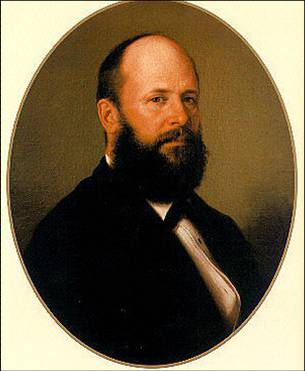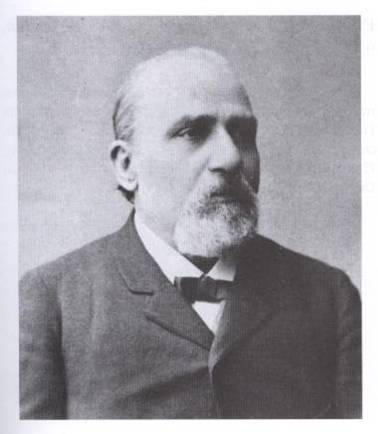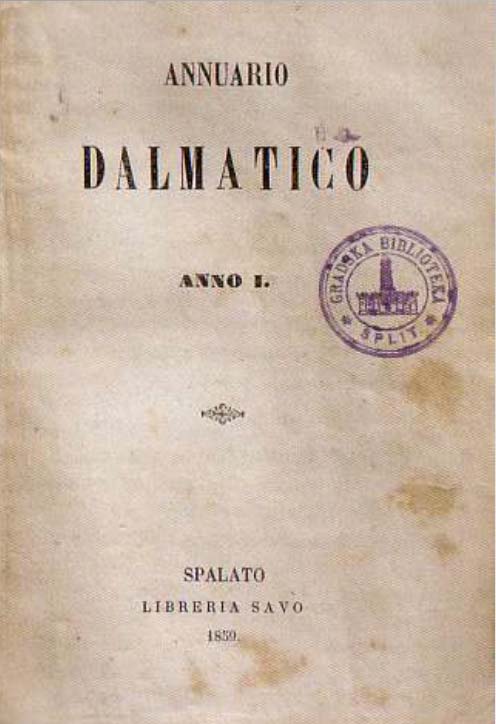|
People's Party (Kingdom Of Dalmatia)
People's Party ( hr, Narodna stranka) was a political party in the Kingdom of Dalmatia. It was founded in 1861 after the failure of Bach's absolutism, as a branch of the People's Party in Kingdom of Croatia-Slavonia. Its members were known as ''narodnjaci'', ''aneksionisti'' or ''puntari''. Its political goal was uniting Dalmatia with Croatia and Slavonia, stemming from their ideological origins in the Illyrian movement. It also gathered prominent Dalmatian Italians as well as Dalmatian Serbs. However, a Serb faction splintered in 1878, led by Stjepan Mitrov Ljubiša, into the Serb People's Party. From 1887 People's Party was renamed People's Croatian Party (), as a result of an internal compromise between the conservative majority led by Miho Klaić and a radical minority led by Mihovil Pavlinović and Juraj Biankini. It united with the Party of Rights in 1905 into the "Croatian Party". Notable members *Gajo Bulat *Miho Klaić *Lovro Monti *Vid Morpurgo *Natko Nodilo *Mihov ... [...More Info...] [...Related Items...] OR: [Wikipedia] [Google] [Baidu] |
Narodni List
''Narodni list'' ( en, people's paper) is an independent Croatian weekly newspaper published in Zadar, founded in 1862, making it the oldest in Croatia. ''Narodni list'', being independent, has a reputation of writing about things other newspapers dare not touch, such as corruption and nepotism among politicians, which often includes writing about organized crime. This newspaper is not to be confused with ''Narodni list'' (USA) that was published in New York by Frank Zotti from 1895. History The newspaper was started in 1862, making it the oldest living newspaper in Croatia, and a part of Croatian cultural history. The first issue of ''Narodni list'' was published on March 1, 1862, as a Croatian-language part of the Italian-language newspaper ''Il Nazionale''. Since 1876, ''Narodni list'' is published entirely in Croatian, playing an important role in unification of Dalmatia and Croatia. From 1920 to 1946 ''Narodni list'' was not published due to Italian fascist government of ... [...More Info...] [...Related Items...] OR: [Wikipedia] [Google] [Baidu] |
Juraj Biankini
Juraj is a given name used in a number of Slavic languages, including Czech, Slovak, and Croatian. Pronounced "You-rye" but with a trilled r. The English equivalent of the name is George. Notable people * Juraj Chmiel, Czech diplomat and politician * Juraj Dobrila, Croatian bishop and benefactor * Juraj Filas, Slovak composer * Juraj Habdelić, Croatian writer and lexicographer * Juraj Herz, Czechoslovakian director * Juraj Jakubisko, Slovak director * Juraj Jánošík, Slovak national hero * Juraj Križanić, Croatian Catholic missionary and first pan-Slavist * Juraj Kucka, Slovak footballer * Juraj Okoličány, Slovak ice hockey referee * Juraj Sviatko, Slovak figure skater * Josip Juraj Strossmayer, Croatian politician, Roman Catholic bishop * Juraj Slafkovský, Slovak ice hockey player * Juraj Hromkovič, Slovak Computer Scientist and Professor at ETH Zürich Derived forms * Jura: ''Czech, Slovak, Moravian, Croatian and Romanian'' * Jure: ''Croatian, Slovene'' * Jurica: ''Cr ... [...More Info...] [...Related Items...] OR: [Wikipedia] [Google] [Baidu] |
Political Parties In Austria-Hungary
Politics (from , ) is the set of activities that are associated with making decisions in groups, or other forms of power relations among individuals, such as the distribution of resources or status. The branch of social science that studies politics and government is referred to as political science. It may be used positively in the context of a "political solution" which is compromising and nonviolent, or descriptively as "the art or science of government", but also often carries a negative connotation.. The concept has been defined in various ways, and different approaches have fundamentally differing views on whether it should be used extensively or limitedly, empirically or normatively, and on whether conflict or co-operation is more essential to it. A variety of methods are deployed in politics, which include promoting one's own political views among people, negotiation with other political subjects, making laws, and exercising internal and external force, including ... [...More Info...] [...Related Items...] OR: [Wikipedia] [Google] [Baidu] |
Political Parties Disestablished In 1905
Politics (from , ) is the set of activities that are associated with making decisions in groups, or other forms of power relations among individuals, such as the distribution of resources or status. The branch of social science that studies politics and government is referred to as political science. It may be used positively in the context of a "political solution" which is compromising and nonviolent, or descriptively as "the art or science of government", but also often carries a negative connotation.. The concept has been defined in various ways, and different approaches have fundamentally differing views on whether it should be used extensively or limitedly, empirically or normatively, and on whether conflict or co-operation is more essential to it. A variety of methods are deployed in politics, which include promoting one's own political views among people, negotiation with other political subjects, making laws, and exercising internal and external force, including wa ... [...More Info...] [...Related Items...] OR: [Wikipedia] [Google] [Baidu] |
Political Parties Established In 1861
Politics (from , ) is the set of activities that are associated with Decision-making, making decisions in Social group, groups, or other forms of Power (social and political), power relations among individuals, such as the distribution of resources or Social status, status. The branch of social science that studies politics and government is referred to as political science. It may be used positively in the context of a "political solution" which is compromising and nonviolent, or descriptively as "the art or science of government", but also often carries a negative connotation.. The concept has been defined in various ways, and different approaches have fundamentally differing views on whether it should be used extensively or limitedly, empirically or normatively, and on whether conflict or co-operation is more essential to it. A variety of methods are deployed in politics, which include promoting one's own political views among people, negotiation with other political subje ... [...More Info...] [...Related Items...] OR: [Wikipedia] [Google] [Baidu] |
Stefan Mitrov Ljubiša
Stefan may refer to: * Stefan (given name) * Stefan (surname) * Ștefan, a Romanian given name and a surname * Štefan, a Slavic given name and surname * Stefan (footballer) (born 1988), Brazilian footballer * Stefan Heym, pseudonym of German writer Helmut Flieg (1913–2001) * Stefan (honorific), a Serbian title * ''Stefan'' (album), a 1987 album by Dennis González See also * Stefan number, a dimensionless number used in heat transfer * Sveti Stefan Sveti Stefan ( Montenegrin and Serbian: Свети Стефан, ; lit. "Saint Stephen") is a town in Budva Municipality, on the Adriatic coast of Montenegro, approximately southeast of Budva. The town is known for the Aman Sveti Stefan resort, ... or Saint Stefan, a small islet in Montenegro * Stefanus (other) {{Disambiguation ... [...More Info...] [...Related Items...] OR: [Wikipedia] [Google] [Baidu] |
Konstantin Vojnović
Konstantin "Kosta" Vojnović ( sr-Cyrl, Константин Војновић; ; March 2, 1832 – May 20, 1903) was a Croatian Serb politician, university professor and rector in the kingdoms of Dalmatia and Croatia-Slavonia of the Habsburg monarchy. Life Family Vojnović was born in Herceg Novi (Kingdom of Dalmatia, modern Montenegro) into the Serb Vojnović noble family. His grandfather Đorđe Vasiljević Vojnović (1760–1821) was a Russian military officer, he later returned to Boka Kotorska, and in 1800, in Ancona, he married Kasandra Angeli-Radovani from a Roman Catholic family. They had a son, Jovan. Count Jovan Đ. Vojinović (1811–1837) died at the age of 26, he married Katarina Gojković whose mother was of the family of Serbian Orthodox Metropolitan Stevan Stratimirović. Katarina later remarried to a Pellegrini. Jovan and Katarina had two sons, Konstantin (Kosta), and his brother Đorđe (Đura). His brother Đorđe (1833–1895) was the mayor of Boka (1863–18 ... [...More Info...] [...Related Items...] OR: [Wikipedia] [Google] [Baidu] |
Jovan Sundečić
Jovan Sundečić (Serbian Cyrillic: Јован Сундечић; 24 June 1825 – 19 July 1900) was a Serbian poet, priest of the Serbian Orthodox Church and a secretary to Prince Nikola I of Montenegro. He is most famous for writing lyrics of contemporary anthem of Montenegro Ubavoj nam Crnoj Gori (''To Our Beautiful Montenegro'').He also lived in Livno as a priest of orthodox churchGlas Crnogorca, 19 October 1999; Jovan MarkušДвије црногорске химне/ref> Biography Sundečić was born in the village of Golinjevo, near Livno, Bosnia Eyalet, Ottoman Empire, (modern-day Bosnia and Herzegovina). His family is of the Šundić brotherhood from Župa near Nikšić in Old Herzegovina. After finishing the Orthodox Seminary in Zadar, Dalmatia province of the Austrian Empire and becoming a priest, he was assigned parish priest and teacher to the Serb colony of Peroj in Istria, Austrian Littoral. After working as a professor at the Zadar Seminary, he became famous as ... [...More Info...] [...Related Items...] OR: [Wikipedia] [Google] [Baidu] |
Lujo Bakotić
Lujo Bakotić (21 November 1867 – 31 March 1941) was a Serbian writer, publicist, lawyer, lexicographer and diplomat. Biography Bakotić was born in Senj to Ignacije Bakotić and Adela Gravisi. He was baptized Alojzije ("Lujo") Juraj Franjo Ivan Josip Bakotić. Though he was Roman Catholic, Bakotić considered himself Serbian, as had his father. He completed his high school (gymnasium) education in Split, and jurisprudence in Vienna and Graz. He was a lawyer by profession who was also politically active, representing the Serbian Party in the Diet of Dalmatia. Owing to his party's ideals he had to flee to Serbia in 1913. With the start of the Great War, he left Belgrade for Niš and then went to Paris and finally Rome, where he was made a secretary in the Vatican to work on a mission, preparing a Concordat between Serbia and the Vatican (which never materialized). After the war, he was Yugoslavia's envoy at the Vatican from 1920 until 1923. He represented the Kingdom of Yugos ... [...More Info...] [...Related Items...] OR: [Wikipedia] [Google] [Baidu] |
Natko Nodilo
Natko Nodilo (31 August 1834 – 21 May 1912) was a Croatian politician, historian, journalist, university professor, and chancellor of the University of Zagreb. Born in Split, he studied theology in Zadar until 1856, when he dropped out of college and took a job as an auxiliary teacher at the Classical Gymnasium in Split. He received a degree in history and geography in Vienna in 1861. He then turned to politics, becoming the editor of the new magazine ''Il Nazionale'', in which he published articles on the principles of national and liberal politics. He was prosecuted in court because of his articles. After abandoning his job as editor, he worked as a teacher at the high school in Zadar and as a representative of the People's Party in the Parliament of Dalmatia, advocating the unification of Dalmatia with Croatia. In 1857 he was appointed as the first professor of general history at the University of Zagreb. After his term as chancellor for the 1890–91 academic year expired, ... [...More Info...] [...Related Items...] OR: [Wikipedia] [Google] [Baidu] |
Vid Morpurgo
Vid Morpurgo (1838–1911) was a Dalmatian industrialist, publisher, politician and member of a notable Split family Morpurgo. Early years and family Morpurgo was born on 7 May 1838 in Split, Croatia to a well-known Jewish family of David-Elija and Anetta (née Gentili) Morpurgo. His great-great-grandfather David-Vita moved to Split in 1774 from Maribor ( Ger.: Marburg), Slovenia. He chose his surname ''Morpurgo'' from the Italian version of the German ''Marburger'' (i.e. someone from Marburg). From 1846 to 1849 Morpurgo attended and finished elementary school in Split. Later he attended the Royal grammar school in Split from which he graduated in 1856. Political and business career After completing his education, Morpurgo was employed at the library which was co-owned by his father and his business partner Petar Savo. There Morpurgo developed bookseller activity enabling him partnership with numerous foreign publishing houses. In 1855 he traveled to Trieste, Italy to sign c ... [...More Info...] [...Related Items...] OR: [Wikipedia] [Google] [Baidu] |
Lovro Monti
Lovro Monti (21 April 1835, in Knin – 9 April 1898) was a Dalmatian politician of Italian descent. He was a Dalmatian Italian, whose grandfather fought for the Republic of Venice against Napoleon, who was also from a family of Italian origin. Biography In 1859 Monti graduated from law school in Padua (Italy), and lately worked as an apprentice in Split for a while. Along with Miho Klaić, Natko Nodilo (another Dalmatian Italian), Mihovil Pavlinović, lawyers Stjepan Mitrov Ljubiša and Konstantin Vojnović, Monti was one of the founders of the People's Party (″Narodna stranka") in Dalmatia, and the Illyrian movement. Since 1862 he worked in Knin as a lawyer, and in 1866 he became the president of the municipality. He has been elected as a deputy in the Dalmatian assembly five times in a row. On the first direct election he became a deputy in a royal council (and was reelected in 1879). He was also one of the leaders and founders of the Italo-Serbian coalition in Dalmatia. I ... [...More Info...] [...Related Items...] OR: [Wikipedia] [Google] [Baidu] |






